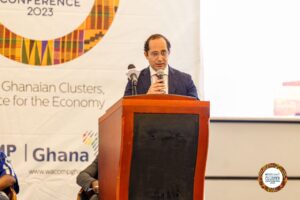- showcases innovations of industrial clusters in cosmetics, fruits & cassava value chains
The 2nd Ghana International Cluster Conference has concluded in Accra with a strong emphasis on enhanced business clusters throughout the ECOWAS region and the utilisation of cluster development methodologies to facilitate integration within the African Continental Free Trade Area (AfCFTA).
With an impressive turnout of more than 200 participants, including cluster experts, industrial professionals, SMEs and support institutions from across Africa, the conference – jointly organised by the United Nations Industrial Development Organization (UNIDO), the European Union and the Ministry of Trade and Industries (MoTI) – was on the theme ‘Ghanaian Clusters: a Catalyst for Economic Growth’.
It served as a platform to showcase innovations and successful outcomes within the fruit, cosmetics, and cassava value chains, which are the primary focus areas of the West African Competitiveness Programme (WACOMP).
The Minister of Trade and Industry, K.T. Hammond, in a speech read on his behalf, reiterated the government’s dedication to giving priority to vital sectors – such as agriculture, trade and industry. This, he said, will breathe new life into the economy and set it firmly on an unstoppable path of growth.
He said the West Africa Competitiveness Programme stands as a pinnacle of engagement and innovation, noting that from its inception, “our involvement has been steadfast; and today, we take pride in the achievements we have accomplished together”.
“Through this programme, we have laid the foundation for cluster development and growth, seamlessly aligning with the government’s ten-point industrial transformational agenda. Working in close partnership with the Ministry of Trade and Industry, you have demonstrated a commitment to excellence that has left an indelible mark on our joint initiatives,” he said.
Mr. Hammond continued that the collective efforts within the framework of WACOMP lent pivotal support to initiatives, such as the One District-One Factory, the Export Development Programme, the Enhancement of Domestic Retail Infrastructure, and the vital nurturing of small and medium-sized enterprises (SMEs) – entities that are not only surviving, but thriving, becoming drivers of job creation and economic stability.
“The impact of our collaboration has been keenly felt across our nation. Companies under the government’s 1D1F programme have undergone transformative training in quality management principles, aligning their practices with national and international standards. This advancement has undeniably improved their competitiveness. Thanks to UNIDO and WACOMP, we have bolstered their capacities in areas such as labelling, branding and good manufacturing practices (GMPs), all of which are essential pillars of sustainable growth,” he stated.
He commended UNIDO and EU for the quality delivery and coordination they have demonstrated over the years, working with the government to promote cluster development, industrial competitiveness, and economic integration.

UNIDO Representative in Ghana and Liberia, Stavros Papastavrou, praised the joint implementation effort of the government, EU and UNIDO.
He said: “What WACOMP-Ghana has done is to prove that MSMEs do not need much to contribute to the economic growth of West Africa. What is needed is fair markets, fair trade, and access to finance on fair conditions. I am particularly happy for the Government of Ghana and the European Union for successfully implementing the UNIDO Cluster Development Methodology in the cassava, cosmetics and tropical fruits value chains”.

On her part, Ebe Muschialli, UNIDO Industrial Development Expert and WACOMP- Ghana Project Manager, added: “The joint commitment of UNIDO and the Government of Ghana have helped the supported Clusters and SMEs members to be more competitive to enter the international market. We are proud of the SMEs we have been working with over the past years, as they have gone a long way. They are producing new and more attractive products that are compliant with international standards. They are now equipped to promote Ghanaian products in Africa and around the world”.
The Chief Technical Advisor of WACOMP- Ghana, Dr. Charles Kwame Sackey, said the clusters are successful drivers for enterprise development, innovation and regional competitiveness and UNIDO considers it to be an efficient policy instrument for entrepreneurship and economic development.
The WACOMP-Ghana has supported over 43,000 actors, including primary producers and SMEs.










